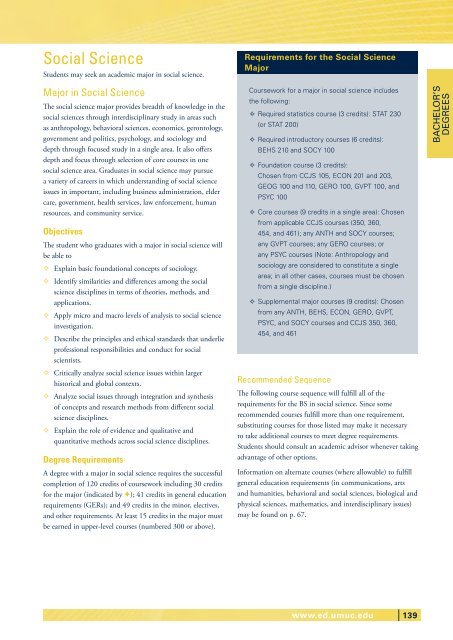UNDERGRADUATE CATALOG - UMUC Europe
UNDERGRADUATE CATALOG - UMUC Europe
UNDERGRADUATE CATALOG - UMUC Europe
You also want an ePaper? Increase the reach of your titles
YUMPU automatically turns print PDFs into web optimized ePapers that Google loves.
Social Science<br />
Students may seek an academic major in social science.<br />
Major in Social Science<br />
The social science major provides breadth of knowledge in the<br />
social sciences through interdisciplinary study in areas such<br />
as anthropology, behavioral sciences, economics, gerontology,<br />
government and politics, psychology, and sociology and<br />
depth through focused study in a single area. It also offers<br />
depth and focus through selection of core courses in one<br />
social science area. Graduates in social science may pursue<br />
a variety of careers in which understanding of social science<br />
issues in important, including business administration, elder<br />
care, government, health services, law enforcement, human<br />
resources, and community service.<br />
objectives<br />
The student who graduates with a major in social science will<br />
be able to<br />
G Explain basic foundational concepts of sociology.<br />
G Identify similarities and differences among the social<br />
science disciplines in terms of theories, methods, and<br />
applications.<br />
G Apply micro and macro levels of analysis to social science<br />
investigation.<br />
G Describe the principles and ethical standards that underlie<br />
professional responsibilities and conduct for social<br />
scientists.<br />
G Critically analyze social science issues within larger<br />
historical and global contexts.<br />
G Analyze social issues through integration and synthesis<br />
of concepts and research methods from different social<br />
science disciplines.<br />
G Explain the role of evidence and qualitative and<br />
quantitative methods across social science disciplines.<br />
degree Requirements<br />
A degree with a major in social science requires the successful<br />
completion of 120 credits of coursework including 30 credits<br />
for the major (indicated by F); 41 credits in general education<br />
requirements (GERs); and 49 credits in the minor, electives,<br />
and other requirements. At least 15 credits in the major must<br />
be earned in upper-level courses (numbered 300 or above).<br />
requirements for the Social Science<br />
Major<br />
Coursework for a major in social science includes<br />
the following:<br />
G Required statistics course (3 credits): STAT 230<br />
(or STAT 200)<br />
G Required introductory courses (6 credits):<br />
BEHS 210 and SOCY 100<br />
G Foundation course (3 credits):<br />
Chosen from CCJS 105, ECON 201 and 203,<br />
GEOG 100 and 110, GERO 100, GVPT 100, and<br />
PSYC 100<br />
G Core courses (9 credits in a single area): Chosen<br />
from applicable CCJS courses (350, 360,<br />
454, and 461); any ANTH and SOCY courses;<br />
any GVPT courses; any GERO courses; or<br />
any PSYC courses (Note: Anthropology and<br />
sociology are considered to constitute a single<br />
area; in all other cases, courses must be chosen<br />
from a single discipline.)<br />
G Supplemental major courses (9 credits): Chosen<br />
from any ANTH, BEHS, ECON, GERO, GVPT,<br />
PSYC, and SOCY courses and CCJS 350, 360,<br />
454, and 461<br />
Recommended Sequence<br />
The following course sequence will fulfill all of the<br />
requirements for the BS in social science. Since some<br />
recommended courses fulfill more than one requirement,<br />
substituting courses for those listed may make it necessary<br />
to take additional courses to meet degree requirements.<br />
Students should consult an academic advisor whenever taking<br />
advantage of other options.<br />
Information on alternate courses (where allowable) to fulfill<br />
general education requirements (in communications, arts<br />
and humanities, behavioral and social sciences, biological and<br />
physical sciences, mathematics, and interdisciplinary issues)<br />
may be found on p. 67.<br />
www.ed.umuc.edu 139<br />
BACHELoR’s<br />
dEGREEs






